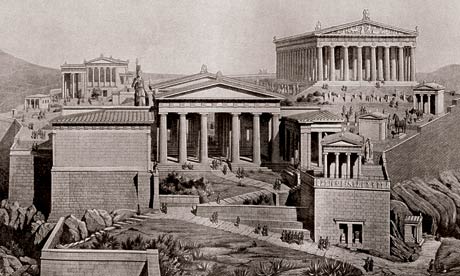by Paul Cartledge
guardian.co.uk
E pluribus unum: "out of many – one". The one-time motto of the US reminds us that, much like most of the larger nation states today, ancient Greece was a mosaic of very different components: about 1,000 of them at any one time between c600BC and AD330. That is, there were a thousand or so separate, often radically self-differentiated political entities, most of which went by the title of polis, or citizen-state. Our term "Greece" is derived from the Romans' Latin name, Graecia, whereas the ancient Greeks spoke of Hellas – meaning sometimes the Aegean Greek heartland, at other times the entire, hypertrophied Hellenic world – and referred to themselves as "Hellenes".
In the foundational epics attributed to Homer, however, you won't find Greeks referred to as "Hellenes" but as "Achaeans", "Danaans", or "Argives". That was because the epics are set in a period before "Hellas" and "Hellenes" had become common currency – before, that is, the eighth century BC, when Greeks first started emigrating permanently from the Aegean basin and settling around the Mediterranean and Black Seas. By the time of Plato, around 400BC, Hellas stretched from the Pillars of Heracles (straits of Gibraltar) in the west to Phasis in Colchis (in modern Georgia) in the far east. Later, following the conquests of Alexander the Great, the pale of Hellenic settlement was extended even further eastwards, as far as Afghanistan and the Indus Valley of Pakistan.
Everyone who was not a Hellene by birth, language or culture was labelled a barbaros. Originally an......
Saturday, November 27, 2010
Subscribe to:
Comments (Atom)



